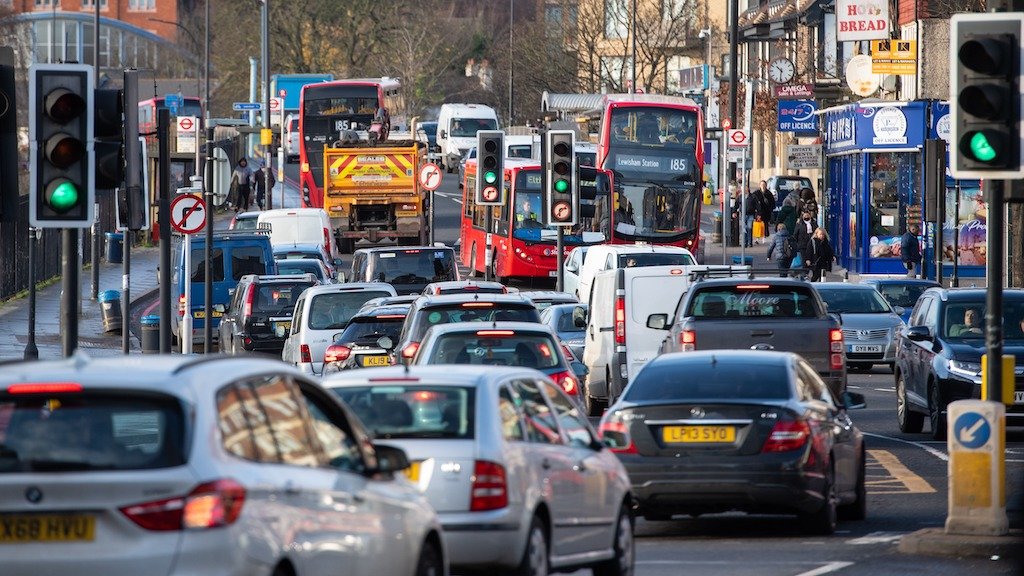London Mayor not willing to put off “too hard” climate action
A new report commissioned by the Mayor of London on how to move London to net-zero carbon emissions by 2030 says car traffic must reduce by at least 27 per cent by the end of the decade and the capital will need a new kind of road user charging system which could be in place by 2024.
The report by specialist energy consultancy Element Energy also sets out the scale of action required to reduce air pollution, tackle the climate emergency and cut congestion “to create a greener, healthier city fit for the future.”
In order to reduce transport emissions by anywhere close to the amount required, says the report, the capital will have to see a significant shift away from petrol and diesel vehicle use and towards walking and cycling, greater public transport use and cleaner vehicles.
However this is running against recent trends. During the pandemic the capital has seen a shift to driving with the cost of congestion rising to over £5 billion last year, leading to gridlocked roads and an increase in toxic air pollution. This is despite statistics showing that more than a third of car trips in London could be made in under 25 minutes by walking, and that two-thirds could be cycled in less than 20 minutes.
The report’s central conclusion is London will need a new kind of road user charging system implemented by the end of the decade at the latest. Such a system could abolish all existing road user charges – such as the Congestion Charge and ULEZ - and replace them with a “simple and fair” scheme where drivers pay per mile, with different rates depending on how polluting vehicles are, the level of congestion in the area and access to public transport.
The Mayor has asked Transport for London to start exploring how the new scheme could be developed with the intention, subject to consultation and feasibility, of implementing it by May 2024.
All options under consideration would be subject to full equality impact assessments, says the Mayor, with mitigations and exemptions put in place for Londoners on low incomes and with disabilities.
A key blocker to the plan is the Mayor does not have the funding or powers to deliver everything required. Mayor of London, Sadiq Khan, said, “This new report must act as a stark wake-up call for the Government on the need to provide much greater support to reduce carbon emissions in London. It’s clear the scale of the challenge means we can’t do everything alone.
“But I’m not willing to stand by and wait when there’s more we can do in London that could make a big difference. We simply don’t have time to waste. The climate emergency means we only have a small window of opportunity left to reduce carbon emissions to help save the planet, and, despite the world-leading progress we have made over the last few years, there is still far too much toxic air pollution permanently damaging the lungs of young Londoners.
“We have too often seen measures to tackle air pollution and the climate emergency delayed around the world because it’s viewed as being too hard or politically inconvenient, but I’m not willing to put off action we have the ability to implement here in London. I’m determined that we continue to be doers, not delayers – not only to protect Londoners’ health right now, but for the sake of future generations to come.
“It’s clear the cost of inaction – to our economy, to livelihoods, to the environment and to the health of Londoners - would be far greater than the cost of transitioning to net-zero and reducing toxic air pollution.”
Professor Lord Nicholas Stern, Chair of the Grantham Research institute on Climate Change and the Environment at the London School of Economics and Political Science, said, “It is very good to see the Mayor of London stimulating debate about the challenges of reaching net-zero emissions in the capital by publishing this set of options. The latest science shows us the ever-more urgent need for action. Cities can lead the way to a zero-carbon economy. This transition will create jobs and growth, and if done well, should also cut air pollution and congestion, making London a more attractive, healthy and productive city.”
Mark Watts, Executive Director, C40 Cities added “Cities have critical agency in the global response to the climate emergency. London's net zero exercise shows how taking big, bold decisions now will unlock huge co-benefits for jobs, health, liveability and fairness in the capital, improving Londoners’ quality of life for decades to come. Everyone who supports the UK’s net zero agenda needs to roll up their sleeves and back Mayor Khan in determining how best to deliver a better low-carbon future for London.”
Oliver Lord, UK Head of Clean Cities Campaign said: “This is one of the most significant announcements from any European city right now. No leader should declare a climate emergency and air pollution crisis and then skip the details, so I congratulate the Mayor and his team on this report. With these plans, the Mayor commits London to a growing momentum to phase out polluting cars. We now need all actors to play their part – the London boroughs and this Government included – so that climate talk becomes the climate walk.”

